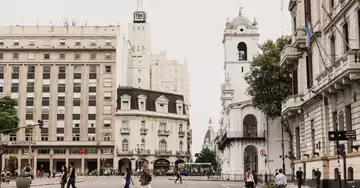Argentina is currently experiencing a real crypto boom. Millions of users entered the market and the stablecoin segment grew sixfold by 2021. The country ranks tenth in the crypto adoption index published by Chainalysis. Local conditions are ripe for adoption: 58% inflation, devaluation of the local currency, and lack of access to US dollars. For many Argentines, cryptocurrencies are the best way to secure their savings.
Banks also got in on the action. Last Monday, Banco Galicia (GGAL), Argentina's largest private bank by market value, added the option to buy and sell cryptocurrencies on its platform. The bank added a feature to the investment section of its app that allows users to purchase Bitcoin (BTC), Ether (ETH), USDC and XRP. On the same day, domestic digital bank Brubank began offering similar services. Both seemed to be an important step toward mainstream adoption of cryptocurrencies in Argentina.
Then the Central Bank of Argentina (BCRA) tried to put the brakes on.
On May 7, just days after the banks' announcements, the BCRA banned banks from offering services for digital assets that are not regulated by the central bank. In other words, banks themselves are no longer allowed to directly promote the buying or selling of cryptocurrencies. Banco Galicia had to suspend its brand-new service.
However, it was not a total crackdown: When Argentines trade on local cryptocurrency exchanges, they can still use their bank accounts to send and receive pesos.
The ban came as a shock to banks involved in the cryptocurrency. Banco Galicia had verbal approval from the BCRA to launch its new feature, sources close to the matter told CoinDesk, explaining that a Nasdaq-listed bank would not enter the cryptocurrency without getting real support from the local regulator. Moreover, up until this point, there was no clear regulation preventing financial institutions from operating in the crypto sector.
But now there is.
According to Lirium, a Liechtenstein-based crypto company that was supposed to operate the function offered by Banco Galicia, four other Argentine financial institutions are planning to launch a crypto trading service after Banco Galicia.
Speculation about the reasons for BCRA's decision is varied. One of the strongest speculations is that BCRA wanted to satisfy the International Monetary Fund (IMF) after the country signed a $45 billion debt agreement with the organization in March that included a provision discouraging the use of cryptocurrencies.
However, following a request for information from local non-governmental organization Bitcoin Argentina a few weeks ago, the BCRA said that "crypto assets are not an explicit target or benchmark of the program."
Sources close to the matter, who are not authorized to speak publicly, told CoinDesk that the BCRA's ban simply reflects a lack of knowledge about the crypto world and a fear that banks will demand U.S. dollars to buy and sell cryptocurrencies.
Currently, the main concern of the monetary authority is the scarce amount of U.S. dollar reserves, especially liquid reserves, which are considered negative by consulting firms. For example, due to this shortage, Argentines are unable to purchase more than $200 per month through banks, and companies in various industries are facing production problems due to import restrictions.
However, Banco Galicia will not acquire its cryptocurrency with dollars from BCRA's reserves, but through a liquidity circuit provided by OSL, a Hong Kong-based digital asset trading platform that began operations in Latin America last October.
Exchanges are wary
The BCRA's decision has no direct impact on Argentina's crypto exchanges. But they are nervously waiting for signals.
According to sources, the BCRA's decision caused confusion among the numerous exchanges operating in Argentina, which have seen high growth rates in the last three years, mainly because Argentines are not prevented from acquiring dollar-pegged stablecoins on their platforms. For example, in 2021, the use of stablecoins increased sixfold, with DAI leading the way.
In Argentina alone, crypto exchange Lemon surpassed 1 million users weeks ago, the company said. Belo, an exchange that began operations in September 2021, has already surpassed 170,000 users and plans to surpass 1 million users before the end of the year at a monthly growth rate of 100%.
But despite the high growth rates, exchanges are still nervous about the regulatory scenario. Most of them interact with the Argentine market - accepting and returning Argentine pesos - as payment service providers, an activity regulated by the BCRA, as there is no specific identity for exchanges in Argentina.
The BCRA has no current plans to take action against exchanges, sources at the monetary authority told CoinDesk. That's understandable: exchanges help ease the desperation of Argentines who want to get rid of their pesos, as foreign exchange restrictions prevent locals from acquiring dollars through banks. And all the companies offer their services without using the BCRA's reserves.
In any case, exchanges are on their guard as it becomes increasingly clear that the current government is not crypto-friendly. This is not the first time the BCRA has intervened. In June, it launched an investigation into nine fintech companies for allegedly offering unauthorized financial intermediation through crypto assets. There have been no further updates on that investigation.
But at least for now, the monetary authority has not prevented these financial institutions from doing business with exchanges. That would be a shot straight to the heart of Argentina's crypto ecosystem.

